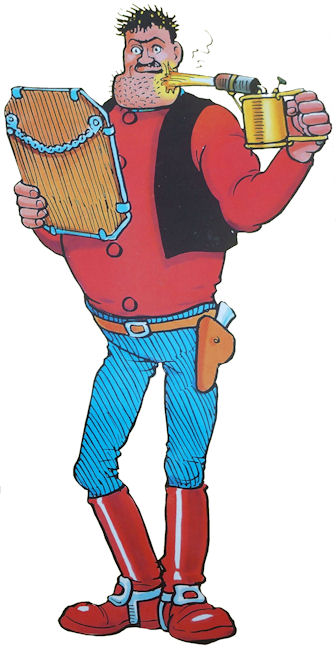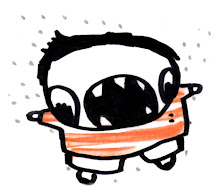
Over at the Britcaster forum, I've found myself in the unaccustomed role of being positively tribal. Not that I have any issues with belonging; but since I left the Scouts - a shadowy, archaic paramilitary organisation for young children - and left a half-filled plastic bin slopping water on the front step of the Scoutmaster, leaning on his inward-opening front door, I've always felt that should I attempt to join any organisation in the future, his ghost will return, wet and uniformed, to haunt me for my disloyalty.
Our Scout group, the 11th Croydon, was in its death throes by the time I graduated from Cubs, populated by four boys, two of whom rarely showed up. It was embarassing. It was something we didn't talk about outside Scouts, the three or four of us, who would meet once a week in the empty church hall. We ran through the rituals with despondency, wondering why there were no girls here, no music, just garters, berets, badges and woggles.
Yet the long-suffering Scoutmaster, whose name, if not his face, I have long since condemned to the bin of forgetting, along with various knots, the right way to make a canoe, and the Cub Scout Law, taught me one thing which has remained indelibly printed, and this was the very essence of scouting, by which I mean the ability to move silently through dense undergrowth without cracking a twig, without being seen, observing the object of your silent pursuit at all times.
On the long summer evenings, he would drive us 20 minutes up to Shirley Heights, a wonderfully high and densely wooded place on the edge of the Surrey Hills proper, where we would soon be lost in the absorption of concentration; we would track him as he slowly walked through trees, bracken, gorse and bramble. He was canny, had good ears and eyes, and when he heard a snap, or saw a glimpse of shirt or face, he would stand rock still and stare through twenty yards of branches straight at us. Mostly he knew exactly where we were, and on the few occasions we outwitted him, he would praise us briefly and without fuss. This weekly event kept me in Scouts months longer than I would otherwise have remained, and the foxy ways of stepping lightly that I learned then have remained with me to this day.
As my adult cynicism grew larger, I threw off all and every imposition, including the family Scouting tradition which my three brothers all continued into their early twenties as Venture Scouts. Thank God for my sister, who post-Brownies found the whole Scouts and Guides malarky entirely bizarre, much as I did, and swiftly moved on to preferred 1970s pleasures: discotheques, Cheesy Quavers, and Pomagne.
My many careful steps through the forest of personal communications, and to the great citadels of Publishing, Broadcast and New Media over the last few years brought me to live in the London Borough of Blogging, and also to set up camp on the Frontier Territory of Podcasting.
Over at the Britcaster forum, I've been arguing that since the authorities who license music in the UK are currently attempting to impose a podcast license upon us in a rather ill-considered way, silence at this point amounts to acceptance. They have cooked up a set of
"podcast rules" (which you can vote on here) which will potentially stifle a lot of perfectly legitimate podcast formats and structures.
For example: "Podcasters shall... obscure at least 10 (ten) seconds at the beginning and end of each individual track played in a podcast with speech or a station ID." Another states, "Podcasters shall not... produce podcasts that contain recordings from a single artist or that have more than 30% of the musical works written by the same composer or writing partnership." Another: "Podcasters shall... ensure that the podcast is at least 15 minutes in length."
It's easy to think up podcasts that break several of these rules at once. Let's say I want to make a podcast featuring and promoting my friend's son's thrash metal band
Super Collider. The band members are all sixteen or seventeen, and they play super-loud trouser-flapping, very short, 30 second original compositions. They practise most nights, and gig as often as possible, and they are just the kind of dedicated, niche group that could really benefit from being featured in a podcast. A podcast featuring their entire set will only last twelve minutes. If I talk over the tracks or use "station" (?) idents as MCPS-PRS would like, I'm obscuring 2/3rds of their repertoire. Because they are sixteen and cripplingly shy offstage, I'd be hard pushed to get more than a word or two from any of them to make up the 15 minutes to acheive "minimum" length.
Another rule states: "Podcasters shall not... insert any flags or other markers in the podcast which may directly indicate or which may be used to indirectly infer the start and end point of tracks or segments of copyright content." What happens if I want to feature John Cage's "Silence", and decide that I will follow a Warhol-like structure by repeating it over and over? Coming from my background, this is a serious point. How else am I going to separate the silences, except by inserting "flags"?
Another rule: "Podcasters shall not... provide an electronic guide to the podcast which contains tracks played and corresponding times." Hang on - that, I believe, means that even our hallowed BBC is at fault for providing track listings on its website for podcast radio shows.
Now the BBC already pay MCPS-PRS millons of pounds a year (albeit at a special, discounted BBC rate) for the use of licensed music, so they can claim they are already covered; but, music aside, the most worrying suggestion
in this license scheme is the mandate that MCPS-PRS are claiming on voice-only podcasts. "Non-music podcasts (e.g. predominantly speech with very little music) will be licensed under a new on-demand scheme for non-music services which is being prepared for launch at the end of April 2006." Can I not now simply record my own voice, singing, muttering, groaning, moaning or elucidating, and put it online without a license? This surely is a step beyond legal, and I have a strong feeling that it infringes not just my rights as a publisher of my own work, and a recorder of my own compositions, but my human rights as determined in the Human Rights Act 1998, Chapter 42:
"ARTICLE 10 - FREEDOM OF EXPRESSION
1. Everyone has the right to freedom of expression. This right shall include freedom to hold opinions and to receive and impart information and ideas without interference by public authority and regardless of frontiers. This Article shall not prevent States from requiring the licensing of broadcasting, television or cinema enterprises." |
I don't see podcasting, which is a syndicated form of electronic publishing, mentioned in there.
There is a very real possibility that clumsy legislation, nonsensical rules, and the imposition of inappropriate pricing could create a situation where as a podcaster using licensed music you are stuck with rigid, unworkable formats, and podcasters in general fall into either a commercial or pirate pigeonhole, with no space for anyone else.
I passionately love the creative, communicative innovations these new media forms offer the artist, and the broadly uncensored nature of the internet, and I want to keep the freedoms we now enjoy. If the "podcast rules" were followed - unlikely at present - the truly awful scenario arises that podcasts will end up sounding just like conventional radio - which is by comparison predictable, hackneyed and formulaic.
Silence, in this case, may well kill off innovation; and independent iconoclast that I am, I've been arguing that we UK podcasters must band together and articulate our needs as a group.
I can see the wet Scoutmaster smiling at me gently, through thirty years of crackling branches.
podcast podcast license scouts

 It has become something of a Blog Mantra not to mention my day job which (I blushingly admit) sometimes is probably the best gig in the world. As an earner, it has its ups and downs just like a rabbit, sometimes grazing peacefully, one eye on the next fluffy shag, sometimes bolting for cover to avoid the foxes of impecunity. Every so often the tasty red carrot of enterprise provides the most spectacular nibble opportunity and sufficient frisk potential for one hundred small bunnies.
It has become something of a Blog Mantra not to mention my day job which (I blushingly admit) sometimes is probably the best gig in the world. As an earner, it has its ups and downs just like a rabbit, sometimes grazing peacefully, one eye on the next fluffy shag, sometimes bolting for cover to avoid the foxes of impecunity. Every so often the tasty red carrot of enterprise provides the most spectacular nibble opportunity and sufficient frisk potential for one hundred small bunnies.
 Sydenham is the nicer end of Lewisham where it borders Croydon at Crystal Palace, the place where I grew up. The borough boundary runs along one side of the great park which houses the National Sports Centre up the long, slow leg-busting hill up to Crystal Palace Parade from lowly Penge. The mighty Victorian mansions, faded, crumbling hulks when I was there in the 1960s and 70s, have once more come into their own, refurbished, rejuvenated and split into flats with majestic frontages and some spectacular views. This is a posh, green part of the borough, with fresh air and middle-classes, and though Hither Green ain't so bad and some other patches, Brockley for example, do pass muster, most of Lewisham is pretty down at heel, the respository and domicile of a great teeming swathe of South East London chav.
Sydenham is the nicer end of Lewisham where it borders Croydon at Crystal Palace, the place where I grew up. The borough boundary runs along one side of the great park which houses the National Sports Centre up the long, slow leg-busting hill up to Crystal Palace Parade from lowly Penge. The mighty Victorian mansions, faded, crumbling hulks when I was there in the 1960s and 70s, have once more come into their own, refurbished, rejuvenated and split into flats with majestic frontages and some spectacular views. This is a posh, green part of the borough, with fresh air and middle-classes, and though Hither Green ain't so bad and some other patches, Brockley for example, do pass muster, most of Lewisham is pretty down at heel, the respository and domicile of a great teeming swathe of South East London chav. Yet I have always had a soft spot for Lewisham, and specifically Catford, because it was the home (though not the birthplace, which was India) of one of my great and enduring heroes, Spike Milligan. I read all of his books as a child; I identified with his musicality, his art, his depression and his comedy. I recognised South London vernacular in his speech patterns, the non-punchline jokes, and the wonderful sharpness of his observations of human lunacy - in particular, Puckoon and his war trilogy Adolf Hitler: My Part In His Downfall, Rommel? Gunner Who?, and Monty - His Part In My Victory all of which I consider essential reading.
Yet I have always had a soft spot for Lewisham, and specifically Catford, because it was the home (though not the birthplace, which was India) of one of my great and enduring heroes, Spike Milligan. I read all of his books as a child; I identified with his musicality, his art, his depression and his comedy. I recognised South London vernacular in his speech patterns, the non-punchline jokes, and the wonderful sharpness of his observations of human lunacy - in particular, Puckoon and his war trilogy Adolf Hitler: My Part In His Downfall, Rommel? Gunner Who?, and Monty - His Part In My Victory all of which I consider essential reading. Resource demand challenges Earth's regeneration capacity. Fish are harvested faster than their natural replacement rate. Water is being withdrawn faster than aquifers are replenished. The biosphere takes one year and nearly three months to renew what humanity exploits in one year, on this analysis.
Resource demand challenges Earth's regeneration capacity. Fish are harvested faster than their natural replacement rate. Water is being withdrawn faster than aquifers are replenished. The biosphere takes one year and nearly three months to renew what humanity exploits in one year, on this analysis. Over at the Britcaster forum, I've found myself in the unaccustomed role of being positively tribal. Not that I have any issues with belonging; but since I left the Scouts - a shadowy, archaic paramilitary organisation for young children - and left a half-filled plastic bin slopping water on the front step of the Scoutmaster, leaning on his inward-opening front door, I've always felt that should I attempt to join any organisation in the future, his ghost will return, wet and uniformed, to haunt me for my disloyalty.
Over at the Britcaster forum, I've found myself in the unaccustomed role of being positively tribal. Not that I have any issues with belonging; but since I left the Scouts - a shadowy, archaic paramilitary organisation for young children - and left a half-filled plastic bin slopping water on the front step of the Scoutmaster, leaning on his inward-opening front door, I've always felt that should I attempt to join any organisation in the future, his ghost will return, wet and uniformed, to haunt me for my disloyalty.















 I have a longish face, not of aardvark proportions, or even horse, just a vertical kind of visage, inherited so far as I can see from both grandfather and father. I look good in wide-brimmed hats.
I have a longish face, not of aardvark proportions, or even horse, just a vertical kind of visage, inherited so far as I can see from both grandfather and father. I look good in wide-brimmed hats.  At this time, I lived in safe but decrepit student digs which became a focus for regular pot-fuelled soirees. I had been laughing all evening, with friends. They had gone to bed, gone home, and I was winding down, still fairly stoned, happy. I was looking into a mirror at myself, after cleaning my teeth, rubbing my big jaw, which ached. Looking at myself, I saw that I was always pulling my chin back, so I spontaneously stuck out my chin, Desperate Dan style.
At this time, I lived in safe but decrepit student digs which became a focus for regular pot-fuelled soirees. I had been laughing all evening, with friends. They had gone to bed, gone home, and I was winding down, still fairly stoned, happy. I was looking into a mirror at myself, after cleaning my teeth, rubbing my big jaw, which ached. Looking at myself, I saw that I was always pulling my chin back, so I spontaneously stuck out my chin, Desperate Dan style.
















